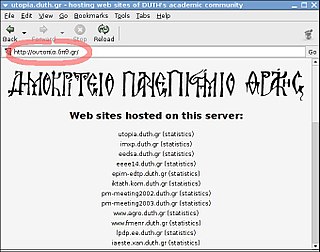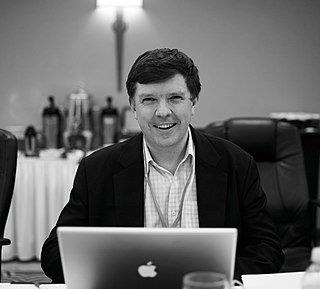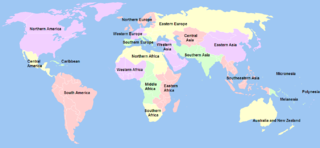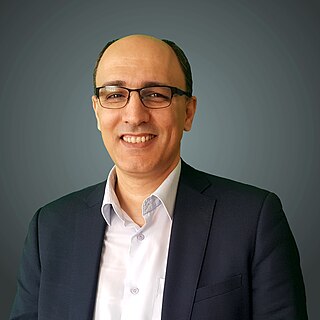Related Research Articles
The American Registry for Internet Numbers (ARIN) is the regional Internet registry for the United States, Canada, and many Caribbean and North Atlantic islands. ARIN manages the distribution of Internet number resources, including IPv4 and IPv6 address space and AS numbers. ARIN opened for business on December 22, 1997 after incorporating on April 18, 1997. ARIN is a nonprofit corporation with headquarters in Chantilly, Virginia, United States.

The Internet Corporation for Assigned Names and Numbers is a global multistakeholder group and nonprofit organization headquartered in the United States responsible for coordinating the maintenance and procedures of several databases related to the namespaces and numerical spaces of the Internet, ensuring the Internet's stable and secure operation. ICANN performs the actual technical maintenance work of the Central Internet Address pools and DNS root zone registries pursuant to the Internet Assigned Numbers Authority (IANA) function contract. The contract regarding the IANA stewardship functions between ICANN and the National Telecommunications and Information Administration (NTIA) of the United States Department of Commerce ended on October 1, 2016, formally transitioning the functions to the global multistakeholder community.

The Internet Assigned Numbers Authority (IANA) is a standards organization that oversees global IP address allocation, autonomous system number allocation, root zone management in the Domain Name System (DNS), media types, and other Internet Protocol–related symbols and Internet numbers.

Esther Dyson is a Swiss-born American investor, journalist, author, commentator and philanthropist. She is the executive founder of Wellville, a nonprofit project focused on improving equitable wellbeing. Dyson is also an angel investor focused on health care, open government, digital technology, biotechnology, and outer space. Dyson's career now focuses on health and she continues to invest in health and technology startups.

A regional Internet registry (RIR) is an organization that manages the allocation and registration of Internet number resources within a region of the world. Internet number resources include IP addresses and autonomous system (AS) numbers.

An internationalized domain name (IDN) is an Internet domain name that contains at least one label displayed in software applications, in whole or in part, in non-Latin script or alphabet or in the Latin alphabet-based characters with diacritics or ligatures. These writing systems are encoded by computers in multibyte Unicode. Internationalized domain names are stored in the Domain Name System (DNS) as ASCII strings using Punycode transcription.

Paul Twomey is an Australian businessman and public policy executive. Twomey is co-founder of STASH, the secure digital storage and content sharing company. He is one of the founding figures of the Internet Corporation for Assigned Names and Numbers (ICANN), the international non-profit organization that coordinates many of the key functions of the global Internet. Twomey was the original chair of its Governmental Advisory Committee (1998-2003) and CEO (2003–10). A former McKinsey & Company consultant (1989–94) he was a senior executive at the Australian Trade Commission and the chief executive of the Australian National Office for the Information Economy, and CEO of Argo Pacific, a high-level Internet and cybersecurity advisory firm. He serves as the founding chairman of the Cybergreen Institute, a global non-profit organization that helps improve the health of the global cyber ecosystem.

.kp is the Internet country code top-level domain (ccTLD) for North Korea (DPRK). It was created on 24 September 2007.
Generic top-level domains (gTLDs) are one of the categories of top-level domains (TLDs) maintained by the Internet Assigned Numbers Authority (IANA) for use in the Domain Name System of the Internet. A top-level domain is the last level of every fully qualified domain name. They are called generic for historical reasons; initially, they were contrasted with country-specific TLDs in RFC 920.
Erika Mann is a senior policy advisor at Covington based in Brussels.

RIPE NCC is the regional Internet registry (RIR) for Europe, the Middle East, and parts of Central Asia. Its headquarters are in Amsterdam, Netherlands, with a branch office in Dubai, UAE.

Internet governance consists of a system of laws, rules, policies and practices that dictate how its board members manage and oversee the affairs of any internet related-regulatory body. This article describes how the Internet was and is currently governed, some inherent controversies, and ongoing debates regarding how and why the Internet should or should not be governed in future.

The United Nations geoscheme is a system which divides 248 countries and territories in the world into six continental regions, 22 geographical subregions, and two intermediary regions. It was devised by the United Nations Statistics Division (UNSD) based on the M49 coding classification. The creators note that "the assignment of countries or areas to specific groupings is for statistical convenience and does not imply any assumption regarding political or other affiliation of countries or territories".

Jean-Jacques Subrenat is a French diplomat who served as ambassador, permanent representative to the Western European Union in Brussels (1995–1998), ambassador to Estonia (1998–2002) and to Finland (2002–2005). He represented France at the Board of Governors of the Asia-Europe Foundation (ASEF) in 2005. He retired from the diplomatic service in September 2005. Speaks, debates and writes on international relations, European Union affairs, Asia, defence and security, global trends and challenges, Internet governance. A member of the At-Large Advisory Committee (ALAC) of the Internet Corporation for Assigned Names and Numbers (ICANN). Currently a member of the IANA Stewardship Transition Coordination Group (ICG). Member of the NetMundial Initiative Coordination Council.
A geographic top-level domain is any of an unofficial group of top-level domains in the Domain Name System of the Internet using the name of or invoking an association with a geographical, geopolitical, ethnic, linguistic or cultural community. The IANA does not recognize these domains as their own group within the Root Zone Database, rather classifying them as generic top-level domains.

Pavan Duggal is an advocate practicing in the Supreme Court of India, specialized in the field of Cyberlaw, Cybercrime Law, Cybersecurity Law, and Artificial Intelligence Law. He is a member of NomCom Committee on Multilingual Internet Names Consortium (MINC).

Satish Babu is a Free Software activist, early Internet advocate, and development professional based out of Kerala, India. He is the founding Director of the International Centre for Free and Open Source Software (ICFOSS), an autonomous academic/research institution of the Government of Kerala, India, where he worked from March 2011 to September 2015. He was earlier the CEO of SIFFS, an NGO of small-scale artisanal fishers of south India; a co-founder and President of InApp Information Technologies; and is associated with international and national professional societies such as IEEE, Internet Society (ISOC), ICANN, and the Computer Society of India (CSI).
The Montevideo Statement on the Future of Internet Cooperation was released on 7 October 2013 by the leaders of a number of organizations involved in coordinating the Internet's global technical infrastructure. The statement was signed by the heads of the Internet Corporation for Assigned Names and Numbers (ICANN), the Internet Engineering Task Force, the Internet Architecture Board, the World Wide Web Consortium, the Internet Society, and the five regional Internet address registries. In large part, the statement is seen as a response to the ongoing NSA surveillance scandal. The leaders made four main points:

Khaled Koubaa is a Tunisian international Internet governance expert and manager of public policy in North Africa at Meta Platforms.

Eduardo Tadao Takahashi was a Brazilian computer scientist and researcher who was credited with contributions toward planning, deployment, and adoption of the internet in Brazil and other Latin American countries. He was a founding director of Brazil's National Research Network (RNP), an academic network that coordinated actions toward setting up the country's national internet backbone. He was inducted into the Internet Hall of Fame in 2017.
References
- 1 2 "BYLAWS FOR INTERNET CORPORATION FOR ASSIGNED NAMES AND NUMBERS | A California Nonprofit Public-Benefit Corporation - ICANN".
- ↑ "Community ICANN". Archived from the original on 2013-02-15. Retrieved 2012-09-07.
- 1 2 3 4 5 6 7 8 9 10 11 12 13 14 15 16 17 18 19 20 21 22 23 "ALAC Profiles".
- 1 2 3 4 5 6 7 8 9 10 11 12 13 14 15 16 17 18 19 20 21 22 23 24 25 26 27 28 29 30 31 32 33 34 35 36 37 38 39 40 41 42 43 44 45 46 47 48 49 50 51 52 53 54 55 56 57 58 59 60 61 "EURALO / At-Large Individual Members".
- ↑ "EURALO / Regional At-Large Organizations (RALOs)".
- 1 2 3 "ICANN | Archives | Former Members of the At-Large Advisory Committee".
- ↑ "Hadia Elminiawi SOI - ALAC - Global Site".
- 1 2 3 4 5 6 7 8 9 10 11 12 13 14 "ICANN | Archives | Committees | At-Large Advisory Committee".